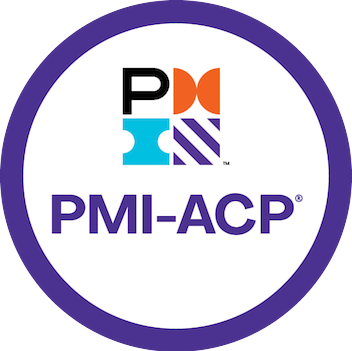PMI Agile Certified Practitioner (PMI-ACP): A Comprehensive Guide to Agile Certification

Introduction to the PMI-ACP® Certification
Overview
The PMI Agile Certified Practitioner (PMI-ACP®) certification, launched by the Project Management Institute (PMI) in 2011, is one of the most comprehensive Agile certifications available today. It was designed for professionals who apply Agile principles, practices, and tools in project management. Unlike certifications that focus on a single methodology, the PMI-ACP® covers a wide range of Agile frameworks such as Scrum, Kanban, Lean, Extreme Programming (XP), and Test-Driven Development (TDD), making it highly valuable for Agile professionals who need versatility in their skillset.

Key Facts
As of 2023, PMI has issued more than 60,000 PMI-ACP® certifications to professionals globally. The certification is backed by over 50 years of PMI’s project management expertise and integrates various Agile frameworks, which makes it unique in the Agile certification space. The PMI-ACP® was developed in collaboration with Agile thought leaders, and its comprehensive approach allows certified individuals to lead Agile teams effectively.
Target Audience
The PMI-ACP® certification is ideal for project managers, Agile coaches, Scrum Masters, and anyone involved in Agile project teams. It is particularly useful for professionals who want to demonstrate their adaptability in applying Agile methodologies across industries and project environments.
Certification Objectives and Learning Outcomes
Core Learning Objectives
The PMI-ACP® certification is designed to help professionals deepen their understanding of various Agile methodologies. The primary objectives are to:
- Master Agile principles and best practices across different frameworks.
- Learn how to manage Agile teams and lead projects using Agile methods.
- Develop skills to effectively respond to change and adapt project delivery based on client feedback and project conditions.
Skills and Knowledge Gained
PMI-ACP® certified professionals gain critical skills in areas such as:
- Agile planning: Crafting Agile roadmaps and managing backlogs.
- Lean project management: Identifying inefficiencies and reducing waste.
- Team collaboration and facilitation: Using Agile to foster a culture of collaboration, quick iterations, and continuous improvement.
- Agile performance metrics: Tracking progress with Agile tools such as burn-down charts, velocity tracking, and cumulative flow diagrams.

Benefits to Professionals
The PMI-ACP® certification can significantly enhance your career by:
- Improving your marketability in industries transitioning to Agile.
- Demonstrating your ability to manage Agile teams and processes across frameworks.
- Boosting your employability and increasing your salary potential. Data from PMI’s Salary Survey indicates that PMI-ACP® certified professionals earn up to 28% more than their non-certified counterparts.
Detailed Breakdown of the Certification Process

- Pre-requisites: Candidates must have:
- 2,000 hours of general project experience (or PMP® certification).
- 1,500 hours of Agile project experience (within the last five years).
- Completion of 21 contact hours of Agile training.
- Training Requirements: Candidates are required to complete formal Agile training through PMI-approved training providers. Many providers offer online modules, workshops, and classroom-based courses.
- Exam Format: The PMI-ACP® exam consists of 120 multiple-choice questions, to be completed within 3 hours. The questions cover a broad range of Agile methodologies, including Scrum, Kanban, Lean, XP, and TDD. Candidates must score at least 70% to pass.
- Certification Levels: PMI-ACP® is a standalone certification with no additional levels. However, professionals can pursue advanced PMI certifications such as Disciplined Agile Senior Scrum Master (DASSM) and Disciplined Agile Coach.
- Recertification: The PMI-ACP® certification is valid for three years. Recertification requires earning 30 PDUs (Professional Development Units) in Agile topics and completing relevant continuing education.
Key Benefits of the Certification for Organizations
Impact on Teams and Organizations
Organizations that employ PMI-ACP® certified professionals can expect to see improved workflow efficiency and collaboration across teams. Certified professionals are trained to manage iterative delivery processes, which leads to faster project turnaround times and increased client satisfaction.
Real-World Application
In companies like Cisco and Microsoft, PMI-ACP professionals have applied their knowledge to reduce project bottlenecks, increase flexibility in managing resources, and improve cross-functional team collaboration.
Industry Recognition
The PMI-ACP is widely recognized by industry leaders across sectors. Companies such as IBM, Deloitte, and Accenture actively seek PMI-ACP® certified professionals to lead Agile transformations, further underlining the certification’s value.

Case Studies
IBM used PMI-ACP professionals to streamline its Agile processes in its cloud computing division. This led to a 20% reduction in project delivery time and a 15% improvement in team velocity.
Certification Costs and Value Proposition

Cost of Certification
The PMI-ACP exam fee is $435 for PMI members and $495 for non-members. Training courses typically cost between $1,000 and $2,000, depending on the provider and region. These costs include the study materials and exam simulation tests.
Return on Investment (ROI)
PMI-ACP certified professionals enjoy significant returns on their investment. Studies show that the average salary increase post-certification is around 20-30%, particularly in sectors such as IT, finance, and telecommunications. Furthermore, many professionals experience improved career prospects as more companies seek qualified Agile project managers.
Financial Aid and Discounts
PMI offers discounts to its members, along with potential scholarships or financial aid programs through approved training providers.
Comparison with Other Certifications
Competitor Analysis
Compared to other Agile certifications such as Scrum.org’s PSM or Scaled Agile’s SAFe Agilist, PMI-ACP offers a broader focus that covers multiple methodologies. This makes it ideal for professionals who need to be proficient in more than one Agile framework. The PMI-ACP® provides a more comprehensive understanding of Agile principles than the Certified ScrumMaster (CSM), which focuses solely on Scrum.
Unique Features
PMI-ACP stands out because it is framework-agnostic, allowing professionals to apply knowledge from Scrum, Kanban, Lean, XP, and more. Its focus on practical application across different industries sets it apart from other certifications that tend to be specific to one methodology.
Industry Trends
PMI-ACP® addresses trends such as remote work, Agile at scale, and the growing importance of DevOps. As companies adopt these trends, PMI-ACP® certified professionals are well-positioned to lead projects with agility and flexibility.

Success Stories and Testimonials

Case Studies
Cisco implemented the PMI-ACP® to improve Agile project management across its software development teams. This resulted in a 25% faster release cycle and greater alignment between development and business teams.
Personal Success
Jane Walker, a PMI-ACP® certified Agile Coach, noted a significant career improvement after certification. « The PMI-ACP® gave me the confidence and skills to lead complex Agile transformations across teams, and it boosted my employability across industries. »
Notable Companies
Top companies such as Intel, Accenture, and GE require or recommend PMI-ACP® certification for project management roles, underscoring its value in the job market.
The Future of Agile and This Certification
Emerging Trends
With the increasing adoption of AI-driven project management and Agile at scale, the PMI-ACP® certification continues to evolve. PMI is constantly updating the certification to incorporate new trends such as Agile for remote teams and the integration of DevOps into Agile frameworks.
Future Updates to the Certification
PMI is planning to introduce advanced certifications in Agile leadership and product management that complement the PMI-ACP® framework. These will allow professionals to deepen their expertise and take on more strategic roles within organizations.
Relevance in a Changing Market
As Agile practices continue to dominate the project management landscape, the PMI-ACP® remains a relevant and essential certification. Its broad scope and applicability across multiple industries ensure that certified professionals are well-prepared to navigate the challenges of an evolving job market.

Conclusion
In conclusion, the PMI-ACP® certification is a valuable investment for any professional looking to enhance their Agile knowledge and boost their career. Its broad application across multiple Agile frameworks, combined with the prestige of PMI, makes it a must-have credential for professionals aiming to lead in Agile environments.